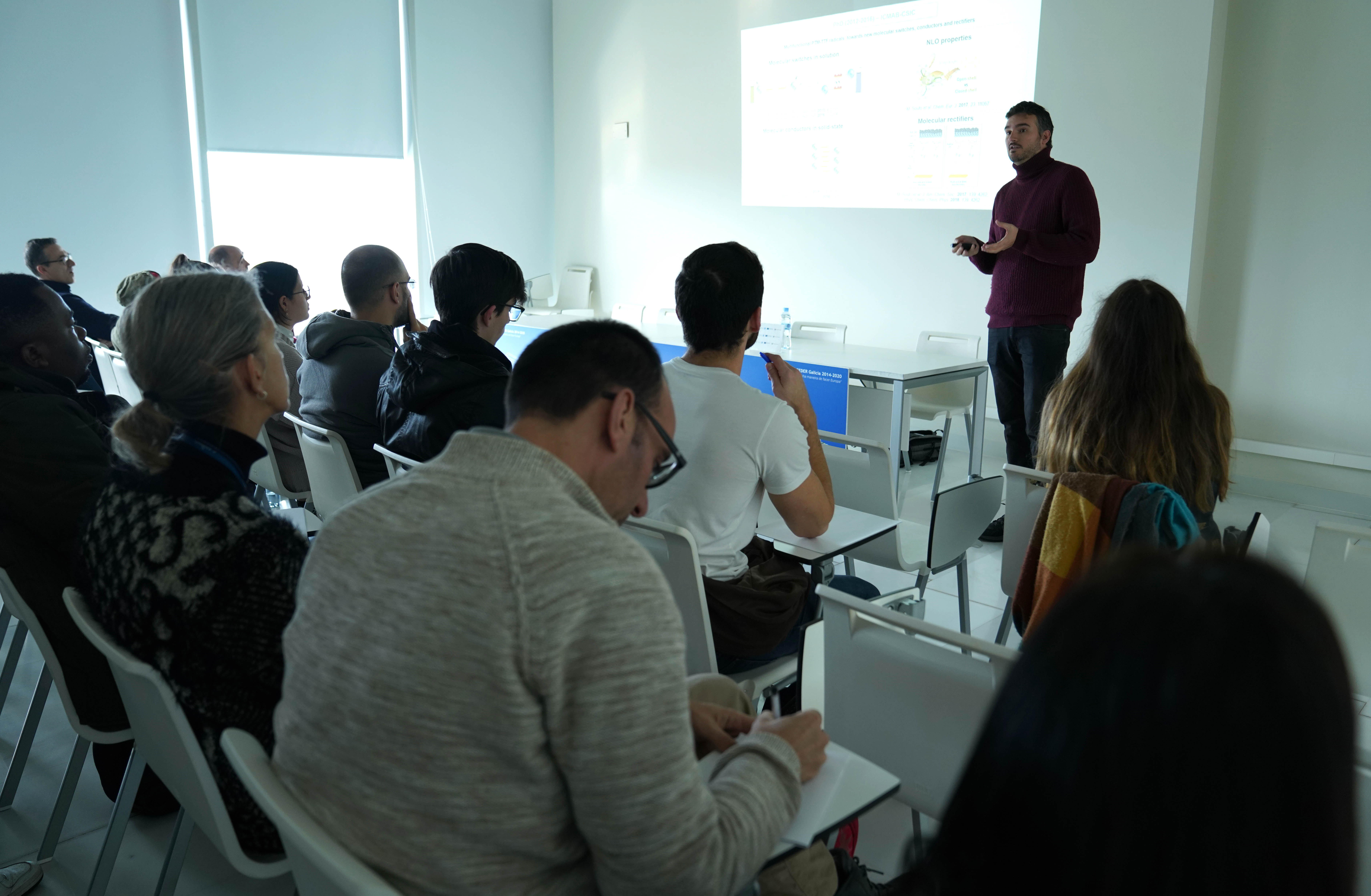Events
O martes 5 de decembro de 2023 o Dr. Manuel Souto Salom (Universidade de Santiago / CiQUS ) ofrecerá o seminario Exploiting the versatility of electroactive organic building blocks for the construction of functional framework materials, dentro do ciclo "CINBIO Seminar Programme".
Será ás 11:00h na Sala de Seminarios da Torre CACTI.

ABSTRACT:
Metal–organic frameworks (MOFs) and covalent organic frameworks (COFs) have emerged in the past two decades as promising crystalline porous materials for gas storage and separation, catalysis, energy storage, sensing, and many other applications, due to their remarkable chemical, structural and functional versatility. Besides their inherent porosity, MOFs and COFs may also incorporate tunable physical (electrical, optical and magnetic) properties which strongly depend on the selected building blocks, becoming very attractive for their implementation as integral components in electronic devices.[1] For example, combining the intrinsic porosity of COFs and electrical conductivity may give rise to multiple applications such as (opto)electronics and energy storage.[2] In recent years, electroactive organic molecules have emerged as promising building blocks for designing and constructing functional porous frameworks such as MOFs or COFs for a wide range of applications (Figure 1).[3] In the first part of the presentation, I will focus on the electrical and photophysical properties of a family of perylene-based MOFs,[4] and the tunable luminescence of MOFs based on persistent organic radicals.[5] In the second part, I will present an approach to improve the electrochemical performance of an anthraquinone-based COF (DAAQ-TFP-COF) cathode material in metal anode (Li, Mg) based batteries through proper selection of the electrolyte and binder.[6] Finally, I will present the synthesis and electrical properties of a series of redox-active tetrathiafulvalene (TTF)-based COFs that were explored as organic cathode materials for lithium batteries.

Figure 1. Schematic representation of the construction of metal–organic frameworks (MOFs) and covalent organic frameworks (COFs) based on electroactive organic building blocks.
Acknowledgements
This work has received funding from the European Research Council (ERC) under the European Union’s Horizon Europe Framework Programme (ERC-2021-Starting Grant, grant agreement no. 101039748-ELECTROCOFS). This work was developed within the scope of the project CICECO-Aveiro Institute of Materials, Grants UIDB/50011/2020 and UIDP/50011/2020, financed by national funds through the FCT/MEC and when appropriate co-financed by FEDER under the PT2020 Partnership Agreement. We thank FCT for funding the project PTDC/QUI-ELT/2593/2021.
References
[1] M. D. Allendorf, R. Dong, X. Feng, S. Kaskel, D. Matoga and V. Stavila, Chem. Rev., 2020, 120, 8581.
[2] M. Souto, D. F. Perepichka, J. Mater. Chem. C, 2021, 9, 1066
[3] M. Souto, K. Strutyński, M. Melle-Franco and J. Rocha, Chem. Eur. J., 2020, 26, 10912.
[4] a) G. Valente et al. Mol. Syst. Des. Eng. 2022, 7, 1065; b) G. Valente et al. 2023, Inorg. Chem. 62, 7834.
[5] G. Valente, P. Ferreira, et al. 2023, Chem. Mater. (under review).
[6] O. Luzanin, R. Dantas, R. Dominko, J. Bitenc, M. Souto. J. Mater. Chem. A 2023, 11, 21553.

BIO:
Manuel Souto Salom (Valencia, 1988) is an Oportunius Research Professor and Principal Investigator at CIQUS (University of Santiago de Compostela). He is also a Guest Professor at the University of Aveiro. He holds a double degree in Chemistry and Chemical Engineering from the University of Valencia (UV) and from the École de Chimie, Polymères et Matériaux (ECPM) de Strasbourg (France), respectively, doing a research internship at PLAPIQUI (Argentina). He also earned a Master’s degree in Molecular and Supramolecular Chemistry (2011) from the University of Strasbourg conducting his Master's thesis at Instituto Superior Técnico (IST, Lisbon). He obtained his PhD in Materials Science at Institut de Ciència de Materials de Barcelona (ICMAB-CSIC) with Prof. Jaume Veciana in 2016 conducting two research stays at the National University of Singapore (NUS) and at the University of Antwerp. In 2017, he started to work as a postdoctoral researcher at the Institute of Molecular Science (ICMol-UV). In 2019, he started his independent career as an Assistant Professor at the Chemistry Department of the University of Aveiro and CICECO-Aveiro Institute of Materials. In 2022 he was promoted to Principal Researcher (tenure, Permanent Researcher/Assoc. Prof.) at the same institution. He received, among other distinctions, the first runner-up NanoMatMol PhD award (2017), the PhD Extraordinary award (2018), and the European Award on Molecular Magnetism Doctoral Thesis (2020). His research interests encompass molecular electronics, electroactive polymers and organic batteries. His main current research interest is the design and synthesis of new functional electroactive porous frameworks (e.g., COFs & MOFs) based on redox-active organic building blocks for energy storage applications. In 2021, he was awarded an ERC Starting Grant with the project ELECTROCOFS, which aims to design new redox-active COF-based electrodes for rechargeable batteries.





